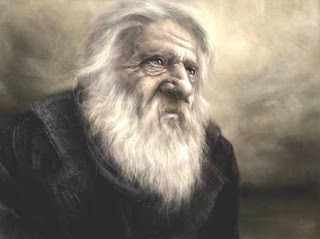"Through Seth, Adam had hope of a godly seed, which includes Enoch
and Noah. But in time there arises a group of people who stray far from
God’s ways.
When people began to multiply on the face of the ground, and daughters were born to them, the sons of God saw that they were fair, and they took wives for themselves of all that they chose...—when the sons of God went in to the daughters ...who bore children to them. These were the heroes that were of old, warriors of renown. The Lord saw that the wickedness of humankind was great in the earth, and that every inclination of the thoughts of their hearts was only evil continually. (Gen. 6:1-5)
What could the godly line of Seth—narrowed eventually to only Noah and his family—do against a culture so depraved that God would eventually decide to destroy it utterly?
Cain's descendants for seven generations to Lamech, whose tyrannical deeds make his ancestor Cain seem tame. Lamech shows us a progressive hardening in sin.First comes polygamy (Gen. 4:19), violating God's purpose in marriage in Genesis 2:24 (cf. Matt. 19:5-6). Then, a vendetta that leads him to kill someone who had merely struck him (Gen. 4:23-24).
Yet in Lamech we also see the beginnings of civilization. Division of
labor —which spelled trouble between Cain and Abel—brings a
specialization here that makes certain advances possible. Some of
Lamech’s sons create musical instruments and ply crafts using bronze and
iron tools (Gen. 4:21-22).
The ability to create music, to craft the instruments for playing it,
and to develop technological advances in metallurgy are all within the
scope of the creators we are created to be in God's image. The arts and
sciences are a worthy outworking of the creation mandate, but Lamech's
crowing about his vicious deeds points to the dangers that accompany
technology in a depraved culture bent on violence." TOW

